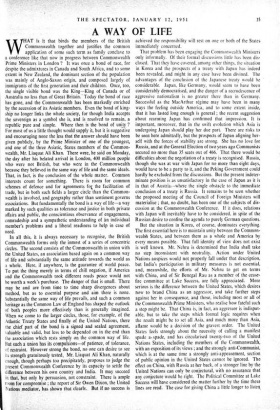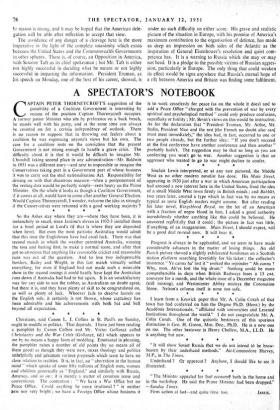AWAY OF LIFE
WHAT is it that binds the members of the British Commonwealth together and justifies the common application of some such term as family conclave to a conference like that now in progress between Commonwealth Prime Ministers in London ? It was once a bond of race, for despite the admixtures in Canada and South Africa, and to some extent in New Zealand. the dominant section of the population was mainly of Anglo-Saxon origin, and composed largely of immigrants of the first generation and their children. Once, too, the single visible bond was the King—King of Canada or of Australia no less than of Great Britain.' Today the bond of race has gone, and the Commonwealth has been markedly enriched by the accession of its Asiatic members. Even the bond of king- ship no longer links the whole society, for though India accepts the sovereign as a symbol she is, and is resolved to remain, a republic pure and simple. Where then is the bond of unity ? For most of us a little thought would supply it, but it is suggestive and encouraging none the less that the answer should have been given publicly, by the Prime Minister of one of the youngest, and one of the three Asiatic, States members of the Common- wealth, Mr. Liaquat All Khan. There were, he said on Monday, the day after his belated arrival in London, 400 minion people who were not British. but who were in the Commonwealth because they believed in the same way of life and the same ideals. That, in fact, is the conclusion of the whole matter. Common interests count for something. There is room for common schemes of defence and for agreements foE the facilitation of trade, but in both such fields a larger circle than the Common- wealth is involved, and geography rather than sentiment governs associations. But fundamentally the bond is a way of life—a way marked by such qualities as tolerance and justice in both private affairs and public, the conscientious observance of engagements, comradeship and a sympathetic understanding of an individual member's problems and a liberal readiness to help in case of need.
In all this, it is always necessary to recognise, the British Commonwealth forms only the inmost of a series of concentric circles. The second consists of the Commonwealth in union with the United States, an association based again on a common way of life and substantially the same attitude towards the world as a whole. Here, if anywhere, is the guarantee of world peace. To put the thing merely in terms of chill negation, if America and the Commonwealth took different roads peace would not be worth a week's purchase. The danger of that is small. There may be and are from time to time sharp divergences about method, but as to essential purpose and aim there is none. Substantially the same way of life prevails, and such a common heritage as the Common Law of England has shaped the outlook of both peoples more effectively than is generally imagined. When we come to the larger circles, those, for example. of the Atlantic Treaty States and finally of the United Nations, there the chief part of the bond is a signed and sealed agreement, valuable and valid, but less to be depended on in the end than the association which rests simply on the common way of life. Hut such a union has its compulsions—of patience, of tolerance, of restraint. However strong the bond, no one can desire to see its strength gratuitously tested, Mr. Liaquat Ali Khan, naturally enough, though perhaps too precipitately, proposes to judge the present Commonwealth Conference by its capacity to settle the difference between his own country and India. It may succeed in that, but only by persuasion, not constraint. There is ample FOOM for compromise : the report of Sir Owen Dixon, the United Nations mediator, has shown that clearly. But if no success is achieved the responsibility will rest on one or both of the States immediately concerned.
That problem has been engaging the Commonwealth Ministers only informally. Of their formal discussions little has been dis- closed. That they have covered, among other things, the situation in Korea and the prospects of a treaty with Japan has indeed been revealed, and might in any case have been divined. The advantages of the conclusion of the Japanese treaty would be considerable. Japan, like Germany. would seem to have been considerably democratised, and the danger of a recrudescence of aggressive nationalism is no greater there than in Germany. Successful as the MacArthur regime may have been in many ways the feeling outside America, and to some extent inside, that it has lasted long enough is general ; the recent suggestion about rearming Japan has confirmed that impression. It is important, moreover, that in the swift evolution which Asia is undergoing Japan should play her due part. There are risks to be seen here admittedly, but the prospects of Japan aligning her- self with the forces of stability are strong. She has no love for Russia, and at the General Election of two years ago Communists secured no more than 35 seats out of 466. That there would be difficulties about the negotiation of a treaty is recognised. Russia, though she was at war with Japan for no more than eight days, would have to be a party to it, and the Peking Government could hardly be excluded from the discussions. But the present indeter- minate position is as unsatisfactory in the case of Japan as it is in that of Austria--where the single obstacle to the immediate conclusion of a treaty is Russia. It remains to be seen whether the proposed meeting of the Council of Foreign Ministers will materialise ; that, no doubt, has been one of the subjects of dis- cussion at the Commonwealth Conference. If it does, relations with Japan will inevitably have to be considered, in spite of the Russian desire to confine the agenda to purely German questions.
But the situation in Korea, of course, dominates everything. The first essential here is to maintain unity between the Common- wealth States, and between them as a whole and America by every means possible. That full identity of view does not exist is well known. Mr. Nehru is determined that India shall take no step inconsistent with neutrality. Action under United Nations auspices would not properly fall under that description, but India's participation in military measures is not essential. and, meanwhile, the efforts of Mr. Nehru to get on terms with China, and of Sir Benegal Rau as a member of the cease- fire committee at Lake Success, are fully appreciated. More serious is the difference between the United States, which desires now to brand China as an aggressor, and take further steps against her in consequence, and those, including most or all of the Commonwealth Prime Ministers, who realise how fateful such a step might be. That China is, in fact, an aggressor is indisput- able, but to take the steps which formal logic requires when the result might be to set all Asia, and much more than Asia, aflame would be a decision of the gravest order. The United States feels strongly about the necessity of calling a manifest spade a. spade, and has circularised twenty-two of the United Nations States, including the members of the Commonwealth, with an exposition of its views ; and the strongly anti-Communist, which is at the same time a strongly anti-appeasement, section of public opinion in the United States cannot be ignored. The effect on China, with Russia at her back, of a stronger line by the United Nations can only be conjectural, with no assurance that any conjecture would be right. The Political Committee at Lake Success will have considered the matter further by the time these lines are read. The case for giving China a little longer to listen to reason is strong, and it may be hoped that the American dele- gation will be able after reflection to accept that view.
The avoidance of any danger of a cleavage here is the more Imperative in the light of the complete unanimity which exists between the United States and the Commonwealth Governments in other spheres. There is, of course, an Opposition in America, with Senator Taft as its chief spokesman ; but Mr. Taft is either not highly successful in deciding what he means or not highly successful in imparting the information. President Truman, as his speech on Monday, one of the best of his career, showed, is under no such difficulty on either score. His grave and realistic picture of the situation in Europe, with his promise of America's maximum contribution to the organisation of defence, has made as deep an impression on both sides of the Atlantic as the inspiration of General Eisenhower's resolution and quiet com- petence has. It is a warning to Russia which she may or may not heed. It is a pledge to the possible victims of Russian aggres- sion, particularly in Europe. The only thing that could weaken its effect would be signs anywhere that Russia's eternal hope of a rift between America and Britain was finding some fulfilment.



































 Previous page
Previous page